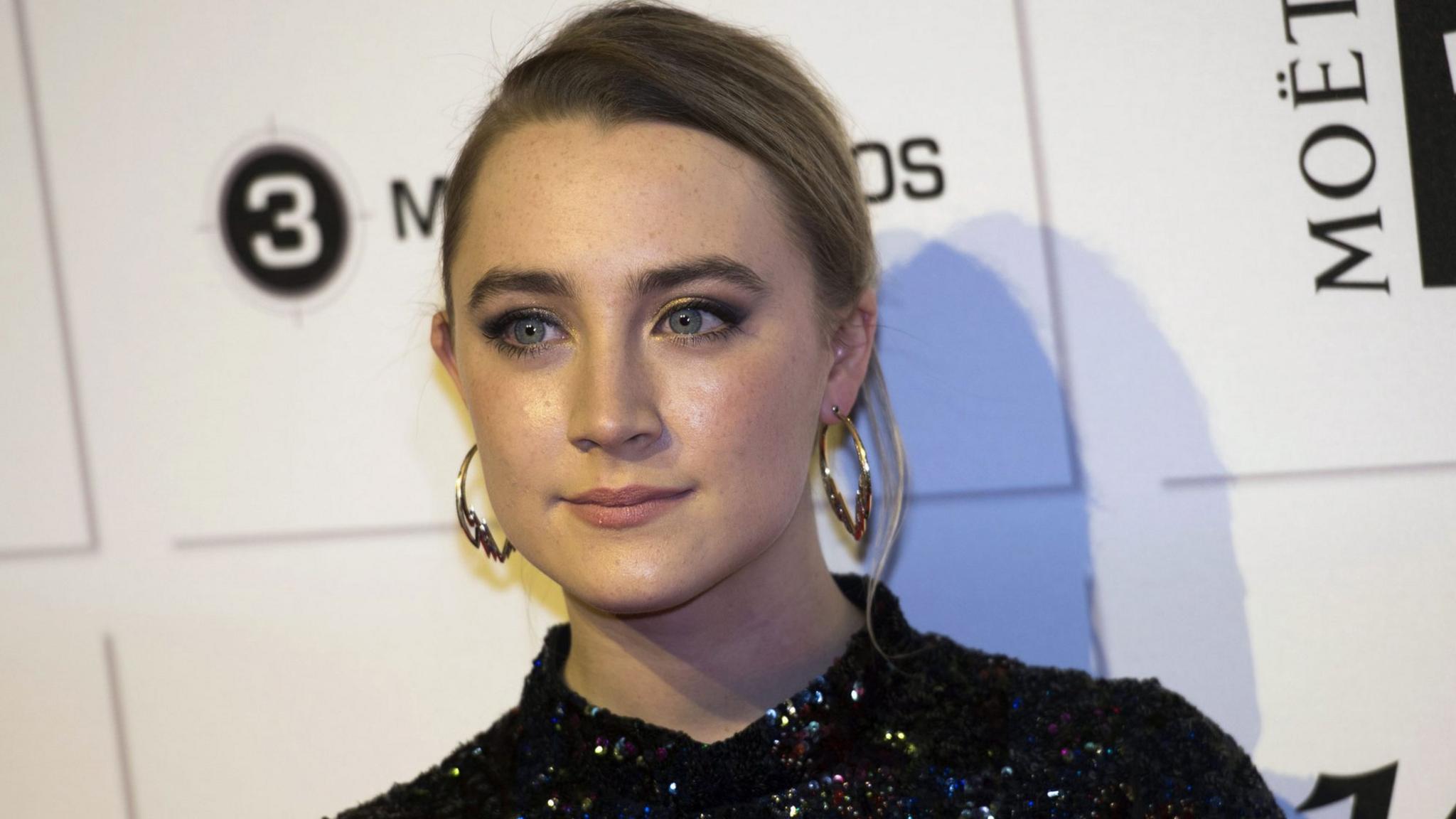Baftas 2016: The Revenant rules at Baftas
- Published
The Revenant, starring Leonardo DiCaprio, dominated this year's Bafta
Wilderness drama The Revenant, starring Leonardo DiCaprio, has dominated this year's Baftas.
It was named best film while DiCaprio won best actor and Alejandro G Inarritu best director.
The Mexican director described the win as "overwhelming". He said DiCaprio's "talent and commitment" to the "risky project" had "kept the film breathing".
The ceremony at London's Royal Opera House on Sunday was hosted by Stephen Fry.
DiCaprio, who plays fur-trapper Hugh Glass, said he was "humbled and honoured" and praised the influence of British actors on his acting career. He also used his win to wish his mother a happy birthday.
Many of Monday's newspaper front pages carried pictures of DiCaprio, with The Independent, external noting that his win "puts him in pole position to win his first acting Oscar" at the end of the month.
This years Bafta awards was watched by a live audience of 4.5 million people - slightly down from last year when nearly five million tuned in.
It's also less than the 5.06 million that the 9pm slot on Sunday usually attracts for BBC One.
Apocalyptic action movie Mad Max: Fury Road took four awards: for make-up and hair, editing, costumes and production design.
Brie Larson won the best leading actress award for her role as a kidnapped mother in Room.
Director Lenny Abrahamson, who picked up the award on her behalf, called her "one of the best actors of her generation."
Both supporting acting prizes went to British winners.
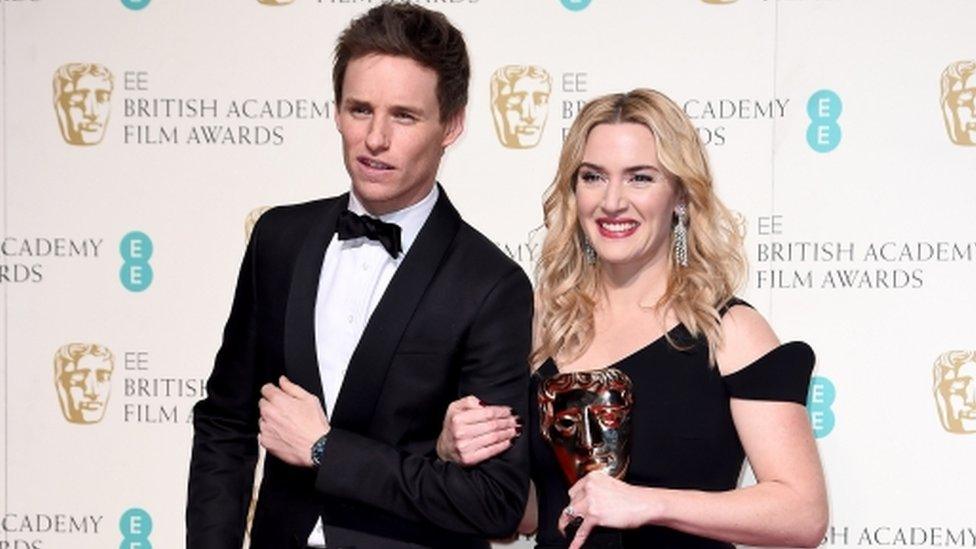
Kate Winslet was presented with her best supporting actress award by Eddie Redmayne
Steve Jobs star Kate Winslet was named best supporting actress, beating double nominee Alicia Vikander, Jennifer Jason Leigh, Rooney Mara and fellow Brit Julie Walters.
Picking up her statuette, Winslet praised her fellow nominees - saying it had been "an extraordinary year for women".
She also gave thanks to the real Joanna Hoffman, Jobs's loyal colleague, who she said was "so wonderful telling her stories to me".
Writing in the Guardian, external, Peter Bradshaw says Kate Winslet's award confirmed she is "almost uniquely capable, at this stage of her career, of playing the lead or the character support".
Mark Rylance won best supporting actor for his role as a British-born Soviet agent in Bridge of Spies.
The first award of the night, for outstanding British film, went to period drama Brooklyn, in which Saoirse Ronan plays a young Irish woman who emigrates to New York.
Its director John Crowley said: "One of the things this film is about is kindness of strangers - as this film has made its way out into the world the warmth of response has been overwhelming."
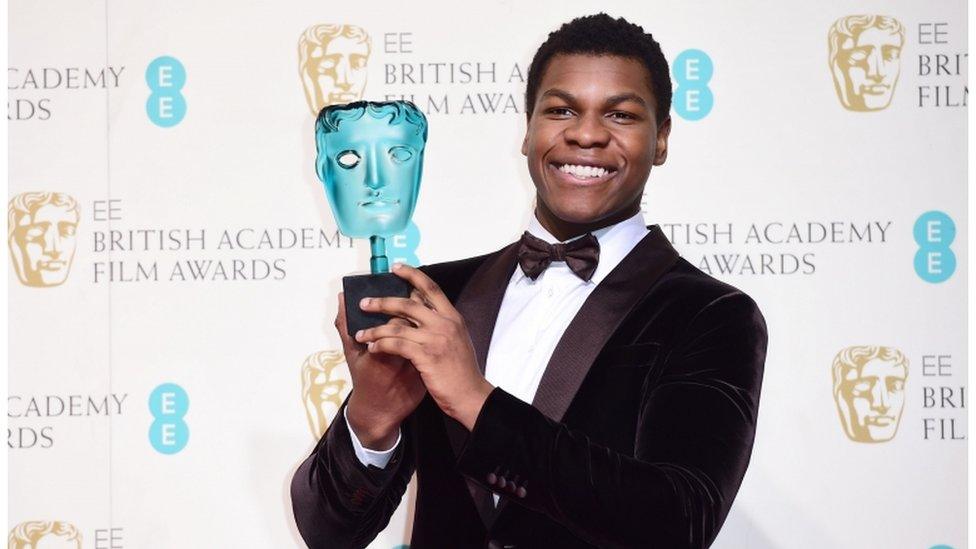
John Boyega's Rising Star award was the only one voted for by the public
'A fluke'
Star Wars actor John Boyega won the Rising Star Award, the only one of the awards to be voted for by the public.
"I haven't been doing this for a long time - it's a fluke," said the London-born actor, who had earlier got the loudest shouts from film fans along the red carpet.
"I'm going to share this with all the young dreamers who are determined and hard-working - this is for you."
Best documentary went to Amy Winehouse film Amy, about the singer who died in 2011.
Director Asif Kapadia said he had wanted to show "how intelligent and how witty she was before it all went out of control".
Producer James Gay-Rees took a swipe at the way she was treated by the media: "Next time someone like that comes along let's try to be a bit more grown-up about it."
But Mitch Winehouse, Amy's father, tweeted: "Please don't congratulate me on the Amy film winning Bafta. This is a one dimensional, miserable and misleading portrayal of Amy. Asif knows."
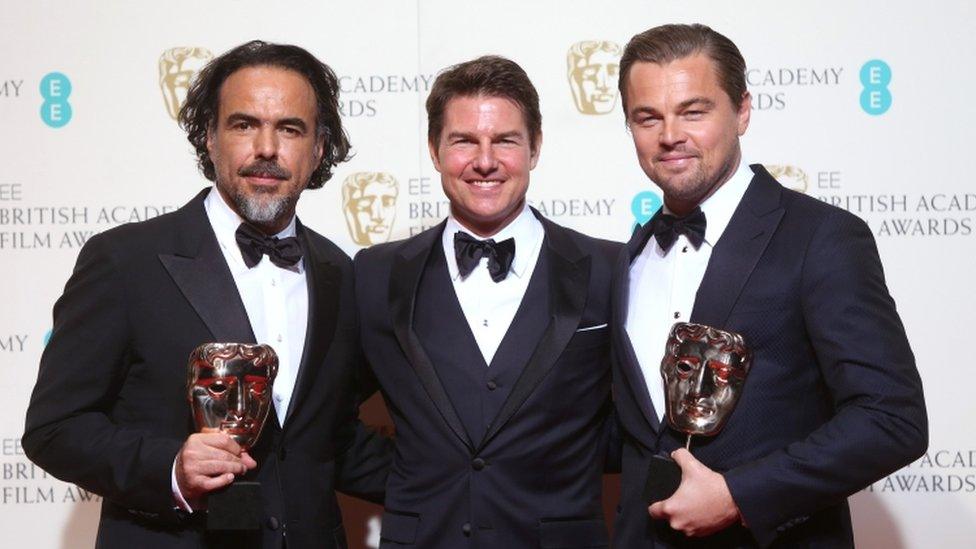
Tom Cruise (c) was on hand to present the best film award to The Revenant, directed by Alejandro G Inarritu and starring Leonardo DiCaprio
Emmanuel Lubezki 's win for cinematography for his work on The Revenant was his fourth Bafta.
The Mexican has won for the past three years, having previously picked up statuettes for Birdman and Gravity. He will be hoping to repeat that feat at the Oscars in two weeks' time.
Some critics praised the Baftas for giving The Revenant so many trophies, given its popularity with audiences as well as critics.
The Telegraph, external noted: "Here's the unexpected lesson of this year's Bafta Film Awards: the industry and the public are more closely in sync than you'd think," wrote Robbie Collin.
Film awards often go to industry favourites rather than crowd-pleasing hits.
But The Revenant has topped the UK box office chart, grossing more than £18m to date.
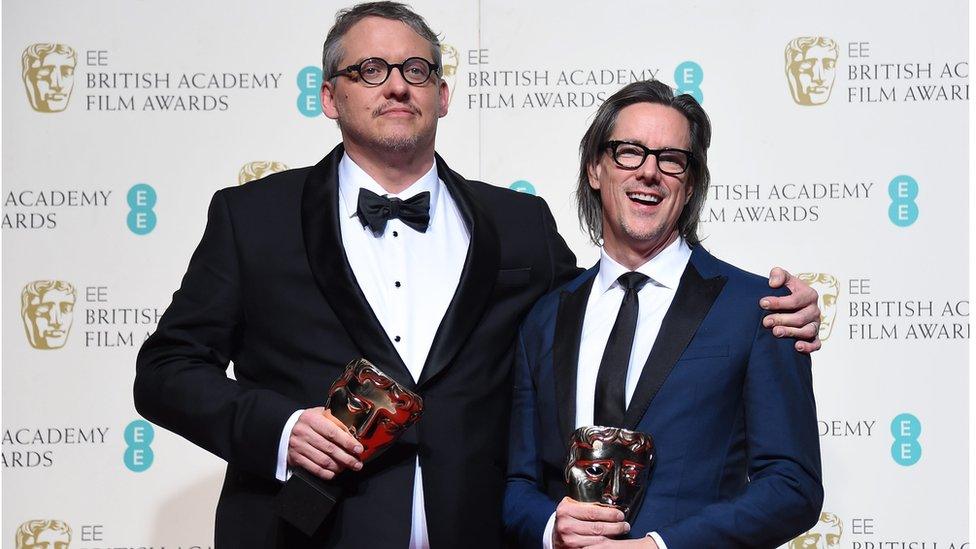
Adam McKay and Charles Randoph won for adapting The Big Short from the 2010 book of the same name for the big screen
Financial crash comedy The Big Short won the award for adapted screenplay.
Director and writer Adam McKay thanked studio Paramount "for taking a risk on this movie".
"This movie is not just about banking, it's about income inequality, and making choices for society that are made by all of us and not just by a select few," he said.
The obituary section included tributes to Alan Rickman, Maureen O'Hara, Omar Sharif, David Bowie, Ron Moody, Frank Finlay, Saeed Jaffrey and Sir Christopher Lee.
Sir Sidney Poitier was honoured with the Bafta Fellowship for his outstanding contribution to film. He was unable to attend the ceremony in person due to health reasons.
However, in a video message from his home in Los Angeles, he said: "Thank you for your warm embrace and this extraordinary moment - a memory I shall cherish always."
Angels Costumes, the world's longest-established costume house, now in its 175th year, received the outstanding British contribution to cinema award.
'Diverse members'
The Baftas have largely avoided the diversity row that has engulfed this year's Oscars.
A small demonstration by members of the Creatives of Colour Network took place near the red carpet.
Australian actress Rebel Wilson made light of the diversity issue on stage when she presented the award, external for best supporting actor, saying she had been "practising my transgender face" in the hope of winning a future award.
"The Baftas have diverse members, and that's what we all want to see in life isn't it? Diverse members," she said.
Her speech went down well on Twitter, credited with lightening the mood of the ceremony which was otherwise serious in tone.
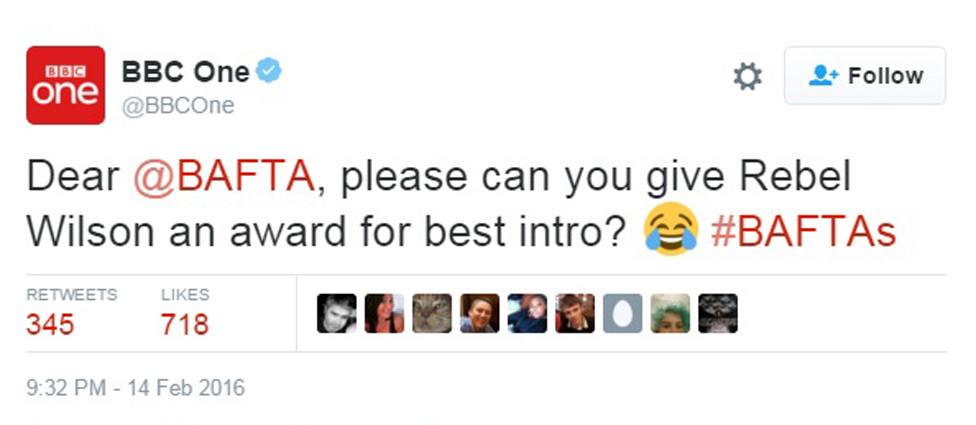
In contrast, host Stephen Fry upset the social media community with comments about Jenny Beavan, who won the best costume design award for Mad Max: Fury Road.
"Only one of the great cinematic costume designers would come to an awards ceremony dressed as a bag lady," he said.
After ruffling feathers on Twitter with the comment, he later posted a picture of himself with Beavan, taken after the ceremony.
"So just a word to the tragic figures who think calling Jenny Beavan a bag lady was an insult. She's a dear friend and she got it. Derrr." He said, trying to defuse the criticism.
But Fry has since deleted his Twitter account, external.
The Guardian noted, external that his comment was one of the few controversial moments in this year's ceremony: "On the plus side, it's the closest thing we had to drama this year," wrote Benjamin Lee.

Bafta analysis
By Tim Masters
In a year where there has been no clear front runner during awards season, The Revenant's five wins puts it in pole position for best picture at the Oscars in a fortnight.
The omens are good.
With the exception of last year's Boyhood, for the past seven years the best film winner chosen by Bafta voters has gone on to win an Academy Award.
So why did it win? Maybe it was that The Revenant is unashamedly cinematic. Its chilly widescreen vistas and adrenalin-pumping action sequences demand to be seen on the big screen.
Leonardo DiCaprio finally shook off his bridesmaid status - he's been nominated for lead actor four times - and won his first acting Bafta.
Many think his Oscar is already in the bag.
Only The Revenant and Mad Max - with four awards - were multiple winners on Bafta night.
Bridge of Spies and Carol both led the Bafta field with nine nominations.
In the end, Steven Spielberg's espionage thriller won just one prize - for Mark Rylance's performance - while love story Carol left empty-handed.
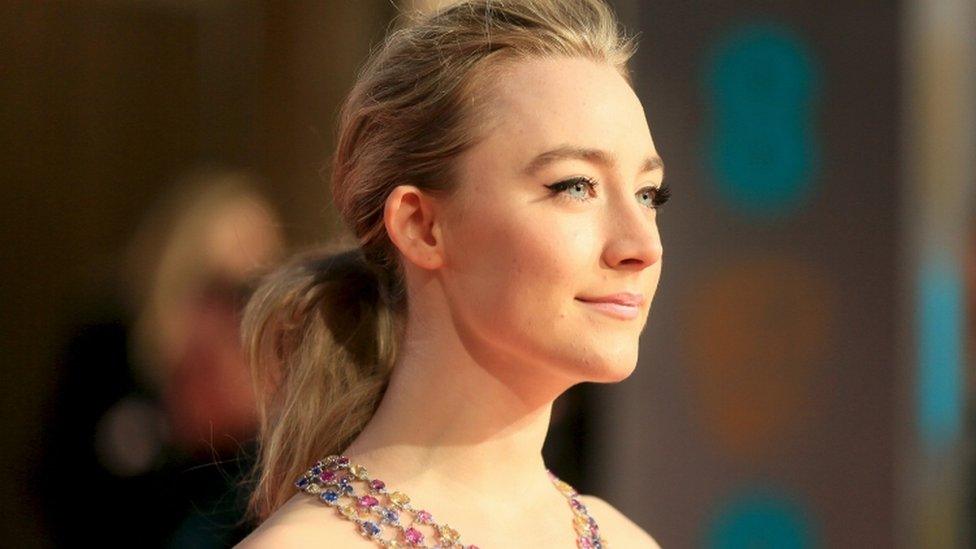
Saoirse Ronan's Brooklyn picked up the first award of the night - outstanding British film
- Published14 February 2016
- Published8 January 2016
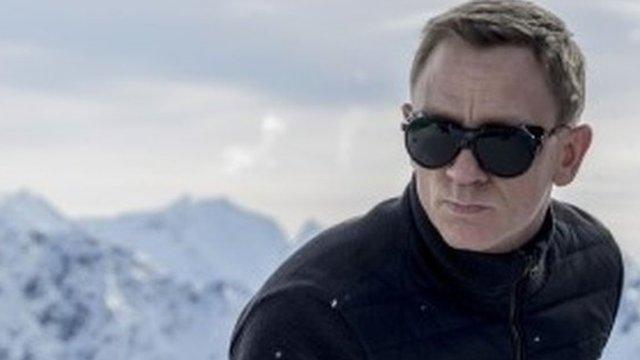
- Published5 January 2016
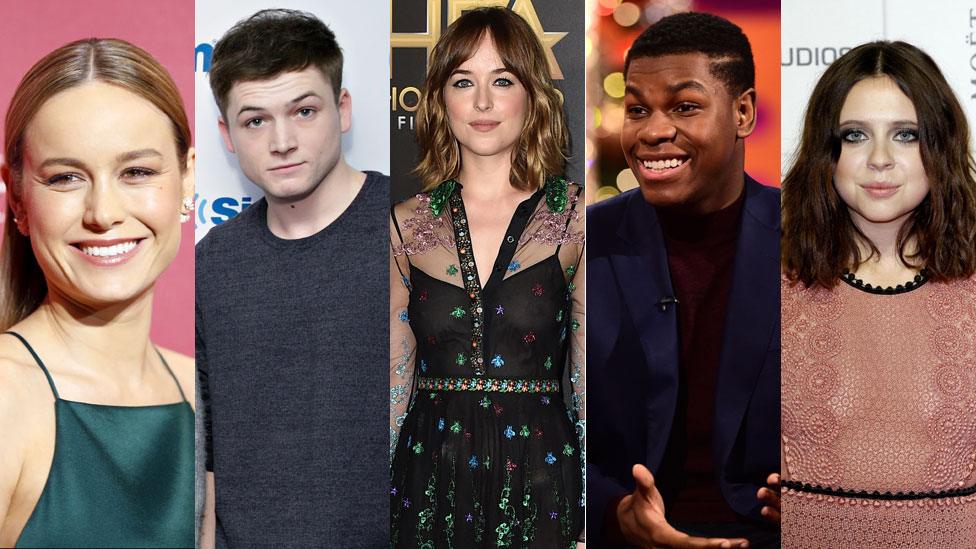
- Published7 December 2015
